
|
Marcus Miller
at the Toronto Jazz Festival |
|
| June 24, 2006 • Main Stage • Toronto |
|
|
|
|
|
|
Bass Jam Theatre
by Dave Barnes with photos by Roger Humbert |
Yes, we were jammed in. There was a big crowd that came out for Marcus Miller at the Toronto Jazz Festival.
With band members Keith Anderson on tenor sax, Patches Stewart on trumpet, Bobby Sparks on keyboards, Poogie Bell on drums and Gregoire Maret on harmonica, we were set to go. Almost. Marcus Miller appears from stage right and gives his opening lines. Except that these are the kinds of lines that tear holes in P.A. systems as the bass slaps cause fibrillation in the speaker coils.
|
Walter Venafro of Jazz FM had spotted some bass players in the audience during his introduction. A show of hands confirms that Toronto's bass players are out in force. They were going to have to be pacified with some form of bass catharsis. Only then would they allow Miller to show off his other talents.
The opening tune sure sounded like a blues call. You know, the thing that musicians do when they get together, just call a blues and a key and then start jamming. Did anyone care what the tune was? Nope. This was a pure excuse to see Marcus explode into a virtuoso display of the ultimate in slap bass technique.
Marcus Miller is a bass phenomenon. The person sitting in front of me can't have been the only one with high-powered binoculars locked in on Marcus’ fret board anxiously scanning to see how he does what he does. Miller must be used to this by now. At one point he joked that he was going to play the next tune with his bass pointed away from a particular audience member so that he couldn't see him play. This is all quite unnecessary. Like sleight-of-hand magic, you see it but you can't tell how it's done.
The master of ceremonies is in top form tonight. Miller bestrides the stage, porkpie hat in place, taking full command of the audience. This kind of inspired theatrics on-the-fly requires star quality.
|
|
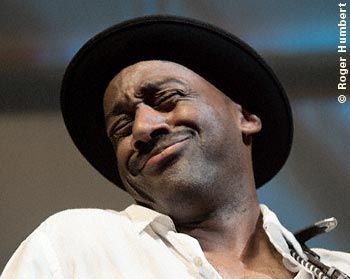 |
|
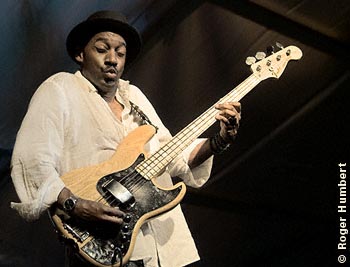
Marcus Miller |
|
|
A quick introduction and we are into "Boogie on Reggae Woman", Miller-style. Stevie Wonder all but reinvented the vocabulary of funk in the early seventies and is, of course, a well known harmonica player. If there was one tune where you would expect a harmonica feature, this was it. But, Miller takes the head in. More surprises are to follow.
A blues version of Beethoven's "Moonlight Sonata"? Well if we are to believe Marcus, his son's practicing the tune convinced him that this was just a blues. It started with a carefully punctuated restatement of the original, gentle theme but things got brutal fast.
Marcus likes to visit his band mates on stage, walking over to them and offering a musical challenge. Toss out a highly syncopated riff and see if they catch it.
|
After doing the rounds, it came to a showdown between Marcus with his wickedly fast slap, multi-fingered arpeggios and hammer-on tricks versus a single, undefended chromatic harmonica. If you have tried one of these instruments, you will know that they are not designed for musical warfare. Getting that chromatic button down in time is tough. We saw a display of virtuoso harmonica that defies description. You shouldn't be able to do that with this instrument. And… the contest was awarded, with the pointing of a drumstick by Poogie Bell to Maret, harmonic player par excellence. Maret is already gaining a reputation and these kind of awe-inspiring stunts just add to it.
A reminiscence from Miller about a conversation with Miles Davis about the merits of simplicity and how you can still evoke complex emotions and we launch into "Jean-Pierre". A muted trumpet, bent Dizzy-style, from Patches Stewart gave us a punchy and satisfying first solo. Soon, we had Miller picking up his solo duties while Bobby Sparks laid down the bass track with one hand while the other kept the organ chords awash.
Flamenco-style picking on a bass is a sight to see and injects surprising flourishes to what would otherwise have been a very solid funk rendering. A quick transition to blues harp and more of the fascinating melodic invention from Maret before closing and a "merci beaucoup" from Miller for the uproar in applause for this tune.
Is the electric bass a percussion instrument? Yes, it can be. Everything from single handed while the strings are muted to double handed frenzy on open strings. On go the foot pedals for wah, phase and distortion effects and we have a percussion orchestra. Between the electronics littering the floor, the bank of keyboards at Sparks's disposal and the occasional midi-fied trumpet of Stewart, we see that this is a Jazz band unafraid of strange noises.
Suddenly, Miller has switched from electric bass to contrabass clarinet. Same register, totally different technique. The mind drifts to Davis's "Bitches Brew" and its signature use on this album but in Miller's hands we don't get the lower edge grunt but the sweetly melodic and intricately phrased tones. The trading between Miller on clarinet and Anderson on sax then Miller and Maret on harmonica are musical highlights and a far place from the opening punchiness.
|
|
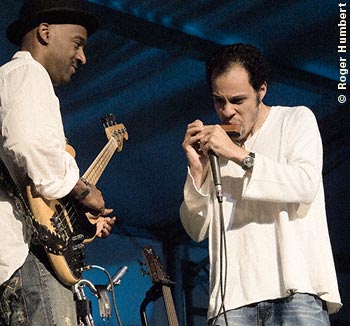
Marcus Miller and Gregoire Maret |
|
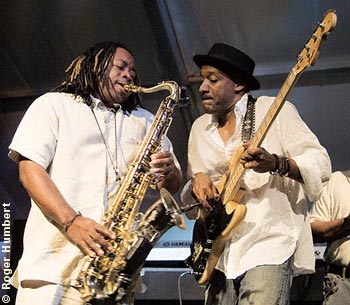
Keith Anderson and Marcus Miller |
|
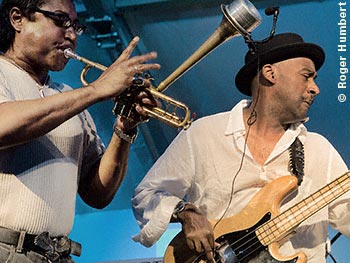
Patches Stewart and Marcus Miller |
|
|
If you remember Edgar Winter's original "Frankenstein" then you remember that Winter was a keyboard innovator with a taste for new sounds. This is the chance for Bobby Sparks to shine and his organ solo over a sustained vamp lets him cut loose for the first time this evening. Finally, Miller signals with pedaled bass that it is time to return to the head and tag it. This final tune brings the crowd to their feet demanding an encore and we get it, and how...
"Tutu" written by Miller in support of Bishop Tutu has taken on emblematic qualities. Here Miller uses it as a vehicle to feature the musicians. A drum solo starts quietly and builds in intensity, handing off to Stewart for his prime solo of the evening, playfully superimposing "Summertime" over the "Tutu" changes and then some bass hammer-on / hammer-off mastery from Miller. We have a round of sax and harmonica solos and then some amusing trading — I'll take your "Stormy Weather" riff and raise you an "It Ain't Necessarily So". Between the Tutu and the vamp themes, Miller casually reaches up and drop-D retunes his E string to give the needed open string effects, technique always in the service of style.
We have the expected wailing, shouts and applause to finish. Great music and great theatre.
|
|
|
The band
Patches Stewart – trumpet
Keith Anderson – tenor sax
Gregoire Maret – harmonica
Bobby Sparks – keyboards
Poogie Bell – drums
Marcus Miller – bass, contrabass clarinet |
|
|
|
|
|
|







